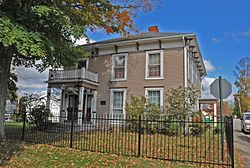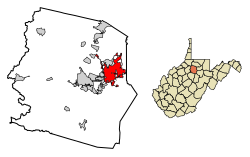Bridgeport is a city in eastern Harrison County, West Virginia, United States. The population was 9,325 at the 2020 census.[2] It is part of the Clarksburg micropolitan area in North Central West Virginia. Bridgeport had its beginning in pre-American Revolutionary War times. In 1764, John Simpson entered the area and gave his name to Simpson Creek. Bridgeport was chartered in 1816.
Bridgeport, West Virginia | |
|---|---|
 | |
| Motto: Opportunity Lives Here | |
 Location of Bridgeport in Harrison County, West Virginia. | |
| Coordinates: 39°17′48″N 80°15′5″W / 39.29667°N 80.25139°W | |
| Country | United States |
| State | West Virginia |
| County | Harrison |
| Government | |
| • Type | Manager Plan |
| • City Manager | Randy Wetmore |
| • Mayor | Andrew Lang |
| Area | |
• Total | 10.73 sq mi (27.80 km2) |
| • Land | 10.69 sq mi (27.69 km2) |
| • Water | 0.04 sq mi (0.11 km2) |
| Elevation | 1,020 ft (311 m) |
| Population | |
• Total | 9,325 |
• Estimate (2021)[2] | 9,257 |
| • Density | 827.05/sq mi (319.33/km2) |
| Time zone | UTC-5 (Eastern (EST)) |
| • Summer (DST) | UTC-4 (EDT) |
| ZIP code | 26330 |
| Area code(s) | 304, 681 |
| FIPS code | 54-10180[3] |
| GNIS feature ID | 1536341[4] |
| Website | www.bridgeportwv.com |
History
editBridgeport was first settled between 1771 and 1774 with the establishment of Simpson Creek Baptist Church, one of the first churches west of the Allegheny Mountains, and surrounding log cabins.[5] The town is believed to have been named for a bridge across Simpson Creek, but it is unclear what bridge was the namesake. Future Virginia governor Joseph Johnson was said to have seen the bridge as a port and named the town as such.[5] Others claim that the town name was meant to be "Bridge Fort," for the two forts built by early settlers, but the name was changed to Bridgeport after a mapmaker mislabeled it.[6] Bridgeport was chartered in 1816 and incorporated in 1887.[5]
The Northwestern Turnpike from Winchester to Clarksburg opened its portion in Bridgeport in 1838; stagecoaches began operating on the line in 1852.[5] During the American Civil War, the town had split loyalties. The Confederate Jones–Imboden Raid of 1863 attacked much of the town's businesses and residents.[5] Establishing stockyards in the early century, the arrival of the Baltimore and Ohio Railroad in the 1850s led Bridgeport to be a center of trade for the cattle industry.[5] Manufacturers opened in the town in the early 1900s, including the West Virginia Pottery Company, Bridgeport Lamp Chimney Company, and later the Master Glass Company.[5]
On June 29, 2006, the city became noted as the site of a showdown over the issue of separation of church and state in the United States. A portrait of Jesus originally hung on a wall at Bridgeport High School. Two parents filed suit in federal court to have the portrait removed, after the Harrison County Board of Education deadlocked over whether to remove the portrait.[1][permanent dead link] The portrait of Jesus was stolen from Bridgeport High School early in the morning on August 17, 2006 and a mirror was put in its place.[7]
Geography
editBridgeport is located at 39°17′48″N 80°15′5″W / 39.29667°N 80.25139°W (39.296544, -80.251305),[8] along Simpson Creek.[9]
According to the United States Census Bureau, the city has a total area of 10.56 square miles (27.35 km2), of which 10.52 square miles (27.25 km2) is land and 0.04 square miles (0.10 km2) is water.[10]
Demographics
edit| Census | Pop. | Note | %± |
|---|---|---|---|
| 1880 | 395 | — | |
| 1890 | 455 | 15.2% | |
| 1900 | 464 | 2.0% | |
| 1910 | 577 | 24.4% | |
| 1920 | 1,346 | 133.3% | |
| 1930 | 1,567 | 16.4% | |
| 1940 | 1,581 | 0.9% | |
| 1950 | 2,414 | 52.7% | |
| 1960 | 4,199 | 73.9% | |
| 1970 | 4,777 | 13.8% | |
| 1980 | 6,604 | 38.2% | |
| 1990 | 6,739 | 2.0% | |
| 2000 | 7,306 | 8.4% | |
| 2010 | 8,149 | 11.5% | |
| 2020 | 9,325 | 14.4% | |
| 2021 (est.) | 9,257 | [2] | −0.7% |
| U.S. Decennial Census[11] | |||
2010 census
editAt the 2010 census there were 8,149 people, 3,458 households, and 2,383 families living in the city. The population density was 774.6 inhabitants per square mile (299.1/km2). There were 3,678 housing units at an average density of 349.6 per square mile (135.0/km2). The racial makeup of the city was 95.5% White, 1.1% African American, 0.2% Native American, 1.9% Asian, 0.2% from other races, and 1.1% from two or more races. Hispanic or Latino of any race were 1.7%.[12]
Of the 3,458 households 30.2% had children under the age of 18 living with them, 56.7% were married couples living together, 9.2% had a female householder with no husband present, 3.1% had a male householder with no wife present, and 31.1% were non-families. 28.2% of households were one person and 12.8% were one person aged 65 or older. The average household size was 2.34 and the average family size was 2.86.
The median age was 44.7 years. 21.9% of residents were under the age of 18; 5.1% were between the ages of 18 and 24; 23.5% were from 25 to 44; 30.8% were from 45 to 64; and 18.8% were 65 or older. The gender makeup of the city was 47.7% male and 52.3% female.
2000 census
editAt the 2000 census there were 7,306 people, 2,988 households, and 2,103 families living in the city. The population density was 880.4 inhabitants per square mile (339.9/km2). There were 3,190 housing units at an average density of 384.4 per square mile (148.4/km2). The racial makeup of the city was 96.93% White, 1.25% African American, 0.05% Native American, 1.05% Asian, 0.19% from other races, and 0.52% from two or more races. Hispanic or Latino of any race were 1.29%.[3]
Of the 2,988 households 30.5% had children under the age of 18 living with them, 60.8% were married couples living together, 7.9% had a female householder with no husband present, and 29.6% were non-families. 26.9% of households were one person and 13.5% were one person aged 65 or older. The average household size was 2.41 and the average family size was 2.94.
The age distribution was 23.0% under the age of 18, 5.7% from 18 to 24, 25.0% from 25 to 44, 26.7% from 45 to 64, and 19.6% 65 or older. The median age was 43 years. For every 100 females, there were 87.2 males. For every 100 females age 18 and over, there were 83.1 males.
The median household income was $49,310 and the median family income was $58,825. Males had a median income of $46,590 versus $29,861 for females. The per capita income for the city was $25,132. About 3.7% of families and 5.0% of the population were below the poverty line, including 6.6% of those under age 18 and 3.6% of those age 65 or over.
Economy
editBridgeport is home to Meadowbrook Mall, a super-regional shopping complex. The mall has a gross leasable area of 849,206 square feet (78,894 m2) and 109 stores.[13] In September 2022, battery startup SPARKZ announced it would convert a former glass plant in Bridgeport into a production facility for zero-cobalt lithium batteries.[14]
Culture
editPete Dye Golf Club opened in 1993, rated the number one golf course in West Virginia and number 60 on America's 100 Greatest Golf Courses by Golf Digest.[15]
Simpson Creek Baptist Church is recognized as the oldest Baptist church in West Virginia by the West Virginia Baptist Convention and is also generally accepted as being the oldest Protestant church west of the Allegheny Mountains. The first formal records of the church are dated 1774.
There are two historic bridges in the city, the Simpson Creek Covered Bridge built in 1881, and the Bridgeport Lamp Chimney Company Bowstring Concrete Arch Bridge built in 1924.
The Governor Joseph Johnson House, also known as Oakdale, was the residence of Joseph Johnson, the 32nd Governor of Virginia. Johnson was the only governor of Virginia from the Trans-Allegheny region.
Education
editBridgeport is served by the public Harrison County Schools district. Schools serving the city include Bridgeport High School, Bridgeport Middle School, Johnson Elementary School and Simpson Elementary School.[16]
Bridgeport is home to a library, the Bridgeport Public Library.
Transportation
editNorth Central West Virginia Airport is located in Bridgeport. Allegiant Air has scheduled service to Orlando–Sanford and Myrtle Beach. United Express offers flights to Chicago–O'Hare and Washington–Dulles.
Notable people
edit- Michael Late Benedum, wealthy businessman who made his fortune in the oil and natural gas industry
- Mike Florio, sportswriter
- Joseph Johnson, 32nd Governor of Virginia and the only from west of the Allegheny Mountains
- Waldo P. Johnson, Confederate States Senator from Missouri
- T. Michael Martin, young adult novelist, author of 'The End Games'
- Benjamin Wilson, U.S. Representative from West Virginia's 1st district
References
edit- ^ "2019 U.S. Gazetteer Files". United States Census Bureau. Retrieved August 7, 2020.
- ^ a b c d "City and Town Population Totals: 2020-2021". Census.gov. US Census Bureau. Retrieved July 2, 2022.
- ^ a b "U.S. Census website". United States Census Bureau. Retrieved January 31, 2008.
- ^ "US Board on Geographic Names". United States Geological Survey. October 25, 2007. Retrieved January 31, 2008.
- ^ a b c d e f g Caldwell, Becky (February 13, 2013). "Bridgeport". e-WV: The West Virginia Encyclopedia. Retrieved April 20, 2023.
- ^ Tuggle, Zach (August 20, 2015). "How 'Bridge Fort' became Bridgeport, and other tales of the city's history". WV News. Retrieved August 29, 2024.
- ^ West Virginia Metro News Network
- ^ "US Gazetteer files: 2010, 2000, and 1990". United States Census Bureau. February 12, 2011. Retrieved April 23, 2011.
- ^ DeLorme (1997). West Virginia Atlas & Gazetteer. Yarmouth, Maine: DeLorme. p.25. ISBN 0-89933-246-3.
- ^ "US Gazetteer files 2010". United States Census Bureau. Archived from the original on January 25, 2012. Retrieved January 24, 2013.
- ^ "Census of Population and Housing". Census.gov. Retrieved June 4, 2015.
- ^ "U.S. Census website". United States Census Bureau. Retrieved January 24, 2013.
- ^ "Archived copy" (PDF). Archived from the original (PDF) on June 21, 2007. Retrieved May 27, 2007.
{{cite web}}: CS1 maint: archived copy as title (link) - ^ "Zero-cobalt Li-ion battery maker SPARKZ announces site for W Va gigafactory". Green Car Congress. Retrieved September 2, 2022.
- ^ "Archived Document". Archived from the original on September 7, 2009. Retrieved November 3, 2009.
- ^ "Harrison County Board of Education". Harrison County Schools. Retrieved April 20, 2023.